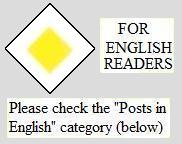Robert Audi defines ethical intuitionism as “the view that we can have, in the light of appropriate reflection (my emphasis!) on the content of moral judgments and moral principles, intuitive (hence non-referential) justification for holding them”. He proposes a Kantian (!!!!!) version of ethical intuitionism and attacks the common conception of intuitionism (the infallibilist, immoderately rationalist, “special faculty” view) [see his article Intuitionism, Pluralism, and the Foundations of Ethics].
Now, according to Audi, there are 4 characteristics of intuitions:
a) noninferentiality / ungroundability (what is intuitively known cannot be (evidentially) grounded in premises)
b) firmness (an intuition must be a moderately firm cognition; a mere inclination to believe is not an intuition)
c) the comprehension requirement (intuitions must be formed in the light of an adequate understanding of their propositional objects; before one can apprehend even a self-evident moral truth, one must get precisely that true proposition before one’s mind)
d) relative pretheoreticality (intuitions are pretheoretical relative to the issue in question: they are neither evidentially dependent on theories nor themselves theoretical hypotheses) (this doesn’t entail that intuition has a complete independence of theory: an intuition may be defeated in the light of theoretical results incompatible with its truth, so this is a sort of a negative epistemic dependence of intuition on theory)
While (a) and (d) seem prima facie reasonable, how can we circumscribe the scope of (b) [a “moderately firm” cognition] and (c) [an “adequate” understanding of an intuition’s propositional object]? Audi says nothing about these problems.
But there is more. Audi asks himself: if noninferential and pretheoretical, to what extent intuitions represent rationality? He answers the question by making a distinction between conclusions of inference (judgments premised on propositions one has noted as evidence) and conclusions of reflection (judgments “which are more like a response to viewing a painting or seeing an expressive face than to propositionally represented information”). He strongly denies the possible critique that “conclusions of reflections” are still based on inference – but unconvincingly to me.
And here comes the strangest thing. He makes a distinction between 2 types of self-evident propositions: (a) immediately self-evident (those self-evident propositions that are readily understood by normal adults; they are obvious, and there are degrees of obviousness); (b) mediately self-evident (those self-evident propositions understood by normal adults only through reflection (my emphasis) on the sorts of case they concern). He thinks that moral principles for intuitionism are mediately self-evident, and further, that „once we appreciate that the kind of self-evidence to which intuitionism is committed is only mediate, we can allow that intuitive moral principles, even if they are self-evident, are knowable through premises as well as by reflection on their content”.
So my question is this: if this is true, then why do we need intuitionism? If we can know moral principles „through premises” (this would be a wonderful thing, because we could logically prove which moral principle is true and which is not), then why do we need intuitionism anymore?
It seems to me that, in this case, intuitionism is superfluous – just as God is superfluous if we claim that we can scientifically explain everything, but nevertheless God exists (see a very nice parable in Anthony Flew, Theology and Falsification).
Just an aside: I think ethical intuitionism CAN be defended – the best leading authors in this field are, in my opinion, Michael Huemer – you can download (on line and free of charge) a part of his book Ethical Intuitionism – and Pekka Vayrynen. The latter wrote the best defense of ethical intuitionism I ever read, in his article Some Good and Bad News for Ethical Intuitionism. I will try to post here soon a synopsis of this article.


